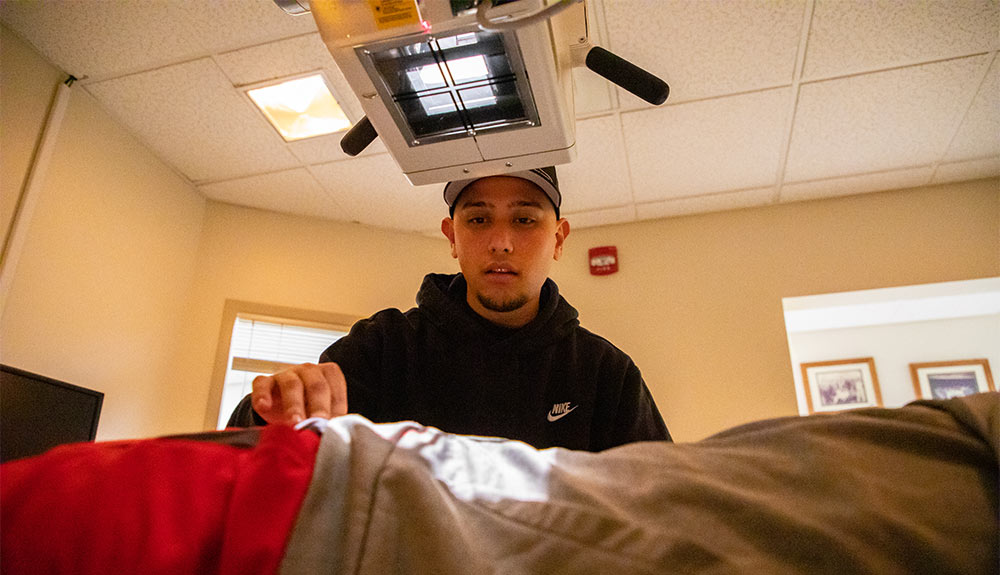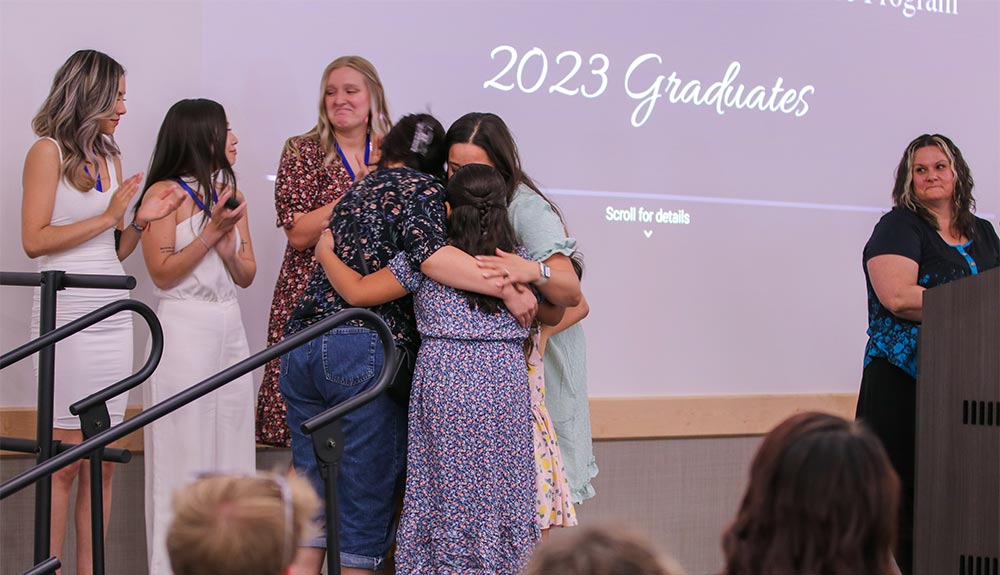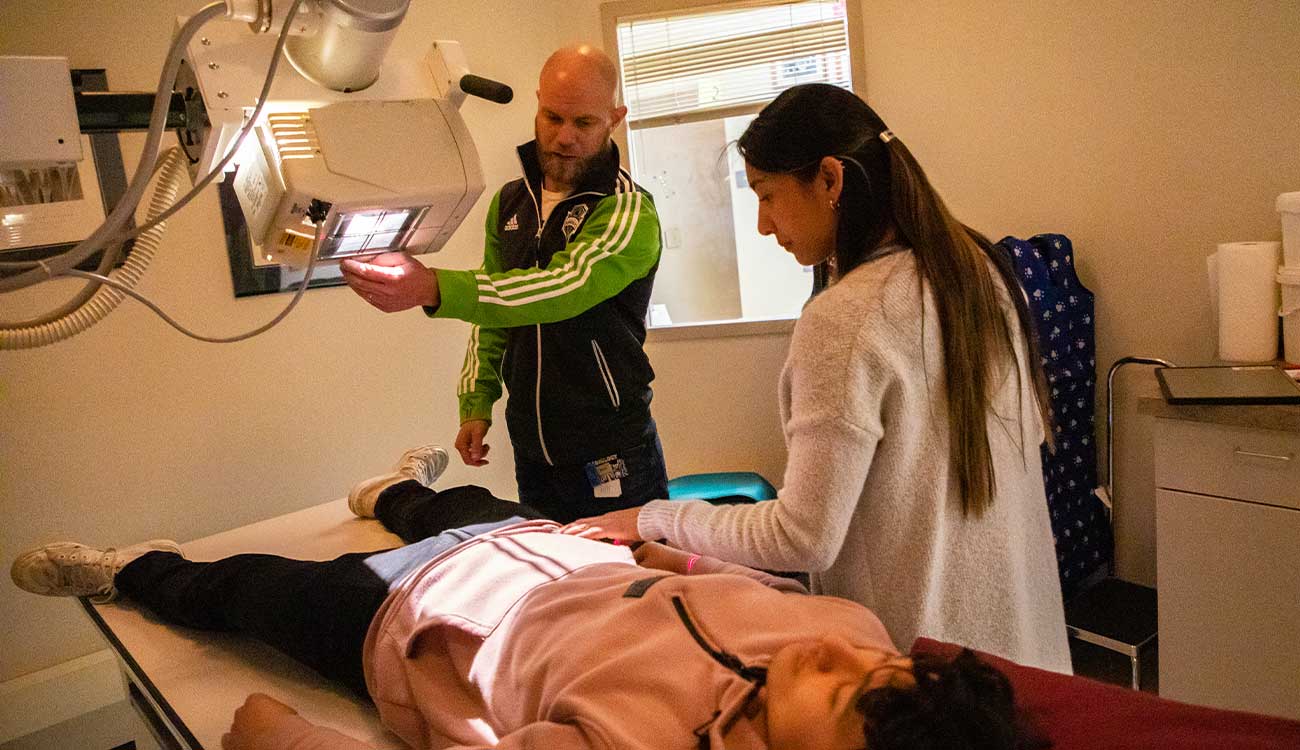Gabby Roberts started working for Yakima Memorial Hospital, now MultiCare Yakima Memorial, as a part-time kitchen staff member in 2017. At the same time, she enrolled in Yakima Valley College’s Radiologic Sciences program to work toward her goal of becoming a radiologic technologist.
Four years later, after completing her degree and passing her boards, Roberts took on a new role as a member of the hospital’s imaging team. It’s a common connection, with almost all of Yakima Memorial’s approximately 70 radiologic technologists being graduates of YVC’s program.
“Throughout the program, we had clinicals at different hospitals and clinics to learn and gain experience in different settings,” Roberts said. “Our clinicals at Memorial were a good chunk of that time, and basically the program is a big interview process because the clinical sites are most likely where you’re going to apply.”
For many years, YVC’s Radiologic Sciences program has played a crucial role in ensuring Yakima Memorial has a steady stream of well-prepared professionals who take the x-rays, CT scans, MRIs and other images critical to delivering care. And ultimately, the health of the entire region benefits from the link between YVC’s program and health care providers like Multicare Yakima Memorial.
“I have a lot of people ask where I graduated from and I say Yakima [Valley College] and they are always so excited that I say that and there’s a personal connection. Patients like that we stay local.”
— Annie Fewell, MultiCare staff member
Preparing the next generation
While working toward her degree, Stephanie Morfin spent approximately four months at Yakima Memorial as part of her clinical rotations.
“That experience was really valuable,” she said. “A lot of the other clinical sites, the pace was a little bit slower. MultiCare is bigger and the number of patients is higher so you get to see and practice a greater variety of things.”
As Morfin’s graduation approached in June 2021, she was encouraged to apply for an x-ray technologist position that was going to open.
“There were a couple techs who liked my work ethic while I was doing clinicals and they suggested that they’d like for me to apply,” Morfin said. “I was comfortable with their equipment, comfortable with knowing my way around the hospital. And since I’m from Mabton, it was a great opportunity to stay local.”
Kari Cosper, imaging services manager at Multicare Yakima Memorial, said those relationships that YVC students build while doing their clinical rotations are important.
“Their entire time here, it’s like an interview with them,” said Cosper. “We get to see their work ethic and can hire the ones who are a good fit with the culture we want here.”
Cosper herself graduated from YVC’s Radiologic Sciences program in 2001 and joined Yakima Memorial’s staff. In her current position, she oversees all of the imaging modalities at MultiCare Yakima Memorial, including the hospital and related facilities.
Most years, Cosper said Yakima Memorial hires at least two or three YVC Radiologic Sciences graduates onto its imaging staff.
“Other facilities in a lot of places have found it difficult to find x-ray techs because they don’t have that pipeline,” she said. “Since COVID, the number of people in the health care industry has dropped, so having a local school has really helped feed our pipeline.

Crucial connections
Radiologic Sciences Instructor Michele Coville noted that every student in YVC’s program completes clinical rotations at MultiCare sites, with most spending approximately 800 to 1,000 hours gaining practical experience at Yakima Memorial and associated sites like Valley Imaging and Orthopedics Northwest.
The value of that hands-on experience is hard to overstate.
“The techs at MultiCare work day-in and day-out with our students,” Coville said. “They’re constantly showing them different and better ways of doing things. The book work doesn’t mean anything if our students don’t get to practice it, and the techs at MultiCare allow them to really do the work and learn to think critically while they’re preparing for their trade.”
While students are at MultiCare, they also are introduced to a broader range of experiences and different types of patients.
“More severe traumas, for example, are going to come to MultiCare as well as some of the more difficult procedures,” Coville said. “That benefits future patients because students gain so much experience during their clinicals.”
“The book work doesn’t mean anything if our students don’t get to practice it, and the techs at MultiCare allow them to really do the work and learn to think critically while they’re preparing for their trade.”
— Michele Coville, radiologic sciences instructor
Annie Fewel, another YVC graduate whose clinicals at MultiCare led to a job waiting for her as soon as she graduated and finished her boards, noted the importance of gaining that real world experience.
“As a student, I was nervous at first because I heard about Memorial being one of the busiest hospitals in the state,” Fewell said. “But in clinicals we learn so much about patient care, learning how to communicate with patients. Each quarter you get more hands-on work and that gives you more confidence as you progress.”
Now that she’s on staff at MultiCare, Fewell also sees the benefits of having co-workers who also are almost entirely fellow graduates of YVC’s program.
“We have all learned the same things, we’ve all gone through the same experiences,” Fewell said. “When you work together with someone who shares that background, the exam flow is better and that means the patient care is better.”
Three of YVC’s clinical instructors are MultiCare staff members, and Coville said the extensive clinical experience at MultiCare sites means graduates are ready to provide high-quality, consistent work right away.
“They know the doctors and the staff from their clinicals, so there’s not stress in getting onboarded because they’ve already done that. There’s not as much chance of an error because they’re not familiar with the facility or a certain procedure.”
In addition, several other MultiCare staff serve on program’s advisory committee.
“That provides our program with a lot of feedback on what’s going well with our students and what aspects of our program we can improve on,” Coville said. “And then we also have folks from MultiCare who are providing advice and input on any changes that we’re looking at making.”

Another factor that Cosper believes makes a difference in the quality of patient care is the fact that the vast majority of YVC’s Radiologic Sciences graduates are from the region.
“Most people who work here were raised here, so they have a strong bond to the people in this community,” Cosper said.
“I have a lot of people ask where I graduated from and I say Yakima [Valley College] and they are always so excited that I say that and there’s a personal connection,” Fewell said. “Patients like that we stay local.”
And she and her fellow YVC alumni also are rooting for the success of future classes of Radiologic Sciences students.
“Now I’ve had chance to work with current students doing their clinics,” Fewell said. “It’s fun to have that opportunity to help teach them so they can be successful too.”
